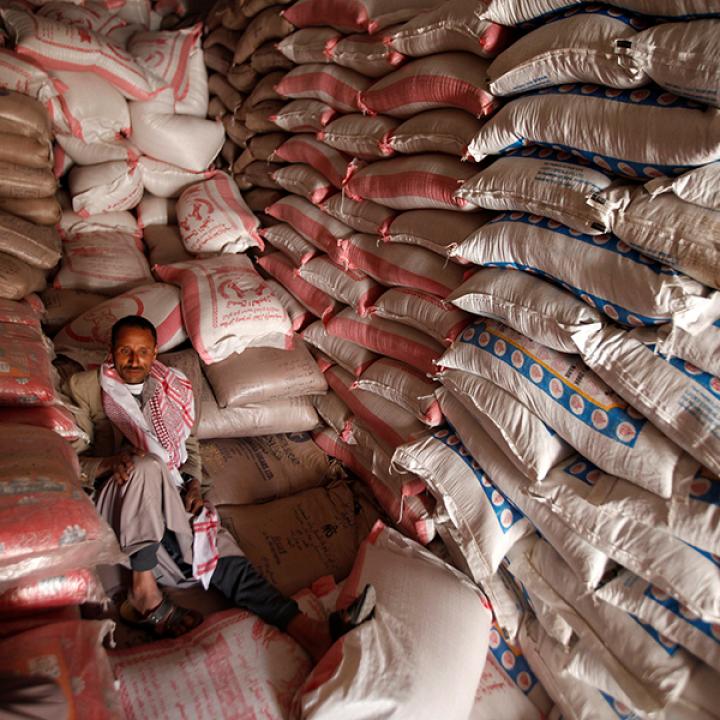
- Policy Analysis
- PolicyWatch 3422
Humanitarian Aid and the Biden Administration: Lessons from Yemen and Syria

Veteran NGO practitioners with deep experience in the aid sector discuss how Washington can help fix flawed approaches to assisting civilians in these two conflict zones.
On January 15, The Washington Institute held a virtual Policy Forum with Jan Egeland, Alex Harper, Emma Beals, and Jomana Qaddour, moderated by Elana DeLozier. Egeland is secretary-general of the Norwegian Refugee Council. Harper is a humanitarian analyst for Mercy Corps, focusing on Yemen and other parts of the Middle East. Beals is a senior advisor with the European Institute of Peace and a nonresident scholar with the Middle East Institute in Washington. Qaddour is a nonresident senior fellow with the Atlantic Council, a member of the Syrian Constitutional Committee, and cofounder of Syria Relief & Development. The following is a rapporteurs’ summary of their remarks.
Jan Egeland
Despite heroic aid efforts by many groups, the global community needs to recognize its failure to protect people from armed conflict and humanitarian crises in Syria, Yemen, and elsewhere. Many politicians and armed actors in these places do not care about the suffering on the other side of conflict lines, especially when faced with an incoherent and impotent international community. But humanitarians must remain hopeful.
Following Joe Biden’s inauguration, humanitarian organizations will once again be able to communicate freely and effectively with the U.S. government, in contrast to the challenges of communicating with the Trump administration. A case in point is the January 10 designation of the Houthis as a terrorist group, which will severely hurt most of the Yemeni population unless the Biden administration reverses it immediately.
That said, it is important to remember that humanitarian efforts under the Obama administration were too often ineffective despite their good intent. The United States was unable to significantly influence the situation for civilians in Syria, especially given escalation of the conflict by the most influential actors, such as Russia, Turkey, and the Gulf states.
Today, humanitarian workers continue to face tremendous operational challenges, while Syrian refugees face miserable conditions in Lebanon and elsewhere. If these refugees are unable to return home in the next few years, both the parties to the conflict and the wider international community will have failed them.
For these and other reasons, it is crucial that the Biden administration and other actors find a way out of the current stalemate, develop solutions that help end the violence, and facilitate progress on these issues at the UN. There are many people at the UN trying to advance the Syrian diplomatic process, but they will not succeed without greater support.
Alex Harper
Yemen’s humanitarian situation is unique in several respects, including the war’s long duration, the large-scale devastation it has wrought on infrastructure, the absence of a meaningful process toward a political settlement, and the continued intervention of foreign actors. Moreover, the country was already in a vulnerable situation before the conflict began, with significant food insecurity. The scale of the aid response is therefore one of the biggest in the world, even to the point where aid represents a big portion of the country’s economy, with all the complications stemming from such.
Despite ongoing population displacement and loss of life, Yemen’s humanitarian need is driven more by economic warfare than the violence of combat itself. Institutional incompetence plagues each side, and in a country wholly dependent on imported food, the amount of need can fluctuate greatly based on the continued decline of the Yemeni rial. Funding dynamics pose a unique challenge, with international contributions decreasing even as demand for aid continues to rise. Also unique is the scale of the response in non-internationally recognized areas under de facto Houthi control, where the majority of aid provision is both situated and headquartered.
Lack of access is therefore the primary challenge to aid operations. Institutional overlap between rival governments has created numerous logistical issues, such as humanitarian workers needing to obtain duplicate visas and permits from multiple ministries. Currency divergence between the Houthis and the Yemeni government likewise wreaks havoc on humanitarian response planning. Sudden inflation resulting from currency instability can have a dramatic effect on aid programs that rely on cash payments.
Further innovation in humanitarian assistance can help find solutions to these challenges, building on existing efforts such as the use of geospatial analysis in monitoring and evaluation. The aid sector has also expanded its knowledge of risk management, which is crucial in dealing with complex conflicts that pose serious access challenges.
For its part, the Biden administration can help by repealing the Houthi terrorist designation. If left in place, this designation will only worsen Yemen’s humanitarian situation. Consistency of funding for humanitarian programming is also crucial; aid should not rely on diplomatic appeals.
Emma Beals
The humanitarian response in Syria is particularly challenging because of the war’s length, the complexity of the aid response, the number of actors involved, the substantial scope of population displacements, and the fact that most of the people who receive aid are deeply dependent on it. Making matters worse, Syrian assistance has been weaponized, primarily through denial. The government in Damascus has coopted it to appease patronage networks, and humanitarian projects are constantly hampered by access restrictions, visa denials, and retribution against people who speak for humanitarian principles, showing a complete disregard for international humanitarian law. The aid system itself has made only limited attempts to remedy this, and very little has changed.
One of the biggest operational challenges of channeling aid in this environment is lack of protection for humanitarian personnel and infrastructure. Workers are routinely attacked, and even with the creation of the UN Secretary-General’s Board of Inquiry, those who perpetrate these abuses are not being held accountable. A culture of impunity continues. The UN Security Council has failed to resolve these issues, in part because some of its permanent members are perpetrators themselves.
One response to this problem has been a shift toward remote programming. There are still people on the ground facing risks, but remote programming allowed NGOs to respond to crises where their in-country presence is or was limited. The Security Council’s creation of a cross-border mechanism—Resolution 2165 and subsequent extensions—has facilitated access, especially in north Syria. This measure is up for renewal in July, so the Biden administration and U.S. allies should ensure that it continues.
Washington and its partners should also shore up commitment to humanitarian access and international humanitarian law at a political level. In addition to renewing the cross-border mechanism, a diplomatic surge is needed to appoint a new senior humanitarian advisor in Geneva and broaden protections for humanitarian workers and operations. Additionally, they must focus on increasing the effectiveness of the aid response in order to create the circumstances in which long-term programming can take place. Funding will continue to decrease, so the administration must learn to do more with less. This begins by strongly advocating for reform of Damascus aid operations.
Jomana Qaddour
Keeping track of what officials say about humanitarian issues is essential. The recent appointment of Samantha Power to lead the U.S. Agency for International Development (USAID) is a hopeful sign, since she views humanitarianism as an essential facet of foreign policy. Antony Blinken’s appointment as secretary of state will likewise facilitate positive developments in the field given how he has reiterated the importance of prioritizing assistance to not only Yemen and Syria, but also Lebanon, whose dire situation directly affects more than a million Syrian refugees. Similarly, incoming national security advisor Jake Sullivan has emphasized that the administration will prioritize humanitarian aid and more favorable refugee policies.
Regarding Yemen, the recent terrorist designation against the Houthis will have an immediate impact on food and medical aid, though Biden’s team seems open to reversing that decision. Another key issue for the administration is reiterating U.S. commitment to multilateral institutions, particularly the UN.
More broadly, an air of politicization has formed around humanitarian assistance, with workers and policymakers looking at it from different vantage points and with different goals. These differences need to be acknowledged. For humanitarian workers, the biggest concern is access to aid, but governments in the United States and other countries often use aid to further their political interests and strategies.
Going forward, stabilization assistance should be part of a larger, longer-term strategy. The international community has long provided humanitarian assistance in place of looking at a conflict’s long-term trajectory. Instead, decisionmakers should reflect on the effectiveness of aid in the long term.
This summary was prepared by Calvin Wilder and Ranwa El Kikhia. The Policy Forum series is made possible through the generosity of the Florence and Robert Kaufman Family.







